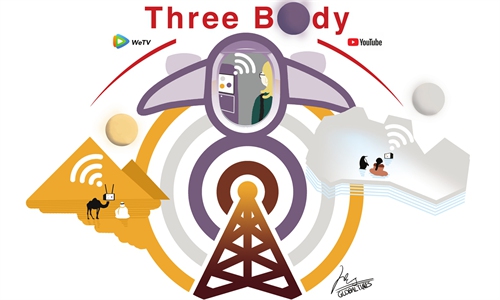ARTS / CULTURE & LEISURE
Galaxy Awards encourage young sci-fi writers

Photo: Courtesy of China Literature Ltd
The 33rd Galaxy Awards, the cradle of Chinese sci-fi writers like The Three-Body Problem's Liu Cixin, announced its winners on Saturday in Ya'an, Southwest China's Sichuan Province.
While no award was given for Best Full-Length Novel due to a lack of nominees, 15 other awards, including Best Novella, were awarded at the event.
Unlike previous awards, such as the 32rd event held in 2021, the 2023 edition's major trend was "youth."
Both born after 1990, young Chinese writers Lu Ban and DongFang Xiaocan respectively won Best Novella with the books Xin Gui (Lit: New Elites) and Mo Ri Du Bai (Lit: Doomsday Monologue).
Zhu Yihua, a fellow sci-fi writer, told the Global Times that "supporting young writers' free spirit" has been a growing trend in Chinese sci-fi industry through means such as the Galaxy Awards.
A white paper on China's online sci-fi literature's development in 2022 has been jointly published by Science Fiction World magazine and the China Science Fiction Research Academy, Sichuan University at the awards ceremony. It also reveals young people's passion for sci-fi.
Taking WebNovel, a noted web novel platform, as an example, the white paper revealed that more than 70 percent of sci-fi web novel writers were born in between 1995 and 2000. In 2022, over 42,000 writers on the site have written works in the sci-fi genre.
Yang Zhan, general manager of the Content Operation Department of China Literature, said at a seminar of the awards that more and more young people are telling new Chinese sci-fi stories through online literature.
In 2022 alone, more than 40,000 sci-fi works were published on major Chinese online literature platform qidian.com, a nearly 70 percent year-on-year increase. Throughout 2022, half the works on the monthly top 10 lists had sci-fi elements.
Feng Jia, a digital publishing expert, told the Global Times that both in China and around the world, young people have established "good circulation circles" for sci-fi.
"Young readers have adapted to the online environment and can digest major sci-fi themes such as the 'universe' and 'metaverse' better than elder readers. Their consumer demand is the major driving force for writers to produce more works," Feng noted.
The 33rd Galaxy Awards added two new awards: the Award for Greatest Adaptation Potential and the Best Sci-fi Channel Award. Both of these seek to encourage the development of Chinese sci-fi IPs and "creatively transforming physical sci-fi works to digital platforms for better overseas promotion," Feng told the Global Times.
According to the white paper, nearly 50 percent of the sci-fi web novels shortlisted by the 2023 Galaxy Awards have been adapted as audio dramas and live-action and animated TV shows and films.
On Ximalaya, China's popular online audio-sharing platform, Ye De Ming Ming Shu (Nomenclature of the Night), an urban myth novel, has earned 1.1 billion plays. The book won the Award for Greatest Adaptation Potential at Saturday's event.
Established in 1985, the Galaxy Awards have witnessed the development of sci-fi in China, with the most notable success being Hugo Award winner Liu Cixin.
"No matter if it is Liu's original work or the recent [film adaptation] Wandering Earth II, Chinese sci-fi works are mostly an embodiment of Chinese values. It opens a window for the world to 'read' China," Chu noted.



